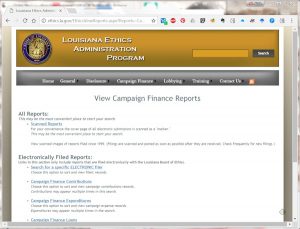Against Shipping Container Prisons for Louisiana’s Children
We stand against shipping container prisons for Louisiana’s children. Certainly, Louisiana lacks sufficient space for detained and incarcerated children. Based… Read More
 I got side-tracked on the Louisiana Board of Ethics website recently. The site is at: http://ethics.la.gov
I got side-tracked on the Louisiana Board of Ethics website recently. The site is at: http://ethics.la.gov
Each year I visit the Board of Ethics website and take an online course in Ethics. This time, though, I explored the site a bit and became intrigued by its robust campaign finance section.
With just a few quick searches using the Board of Ethics’ “Campaign Finance Contributions” search engine, it was easy to tally the amounts of money given by the Healthy Louisiana managed care organizations to the campaign funds of Louisiana’s elected officials and political action committees. My few simple searches totaled to nearly $750,000.
That’s a lot of money! These contributions to elected officials are not made for entirely charitable purposes. These donations happen because profit happens.
As Thomas P. DiNapoli, state comptroller for New York (think “Wall Street”) said, “Shareholders need transparency in order to determine whether corporate political spending benefits the company’s long-term value.” Campaign contributions are ultimately about return for shareholders. Now, if you own stock in a company, that’s a fine thing.
Unless it’s not.
Shareholder return is a fine thing unless the money could be better spent in accord with the donating company’s mission. In my opinion, here in Louisiana there is no better way for a managed care company to better spend these campaign contributions than to fund services for children. After all, that is the reason Louisiana created a Medicaid-funded managed care system for children’s behavioral health.
In Louisiana we talk about Medicaid in terms of billions of dollars. In the business world, that’s called a large market. Managed care organizations operate in Louisiana as profit-driven companies and they will continue operating in this market only if there is profit.
As I understand it, under Healthy Louisiana, the managed care organizations profit by spending less per member per month than they are paid per member per month. Money not spent on services for Louisiana’s citizens becomes profit. Profit is used to fund political campaign contributions. As the gentleman from New York suggests, campaign contributions are designed to benefit a company’s long-term value – that is, to increase profit.
But here’s an idea. What if all the Medicaid companies profiting in Louisiana quit using profits to make campaign contributions to Louisiana’s elected officials? What if they invested that money for better outcomes by funding additional services for children?
I imagine the three quarters of a million dollars in campaign contributions tallied on the Board of Ethics’ website has been spent. But, going forward, what if Louisiana’s elected officials determined to use contributions from the Healthy Louisiana companies to fund additional services for children? Is that permitted? Can an elected official tell a donor to his or her campaign fund, “no, take this money and spend it on children?” I don’t know.
I believe spending campaign contributions received from the corporations responsible for managing the care of Louisiana’s children ON Louisiana’s children would be more in keeping with the image on our state flag. Louisiana’s pelican sits in her nest surrounded by her young, pricking her own heart to ensure her young have all they need.
Today, Louisiana’s children do not have all they need. According to the U.S. Census Bureau’s 2015 data, 66% of children under 5 years of age in East Carroll Parish live BELOW the poverty level. For most, life gets no better as they age. 67.1% of children aged 5-17 in that parish live BELOW the poverty level.
Given the status of the Healthy Louisiana contract extensions, the campaign contributions by the MCO’s are not paying off in political good will. The Joint Legislative Committee on the Budget has postponed approval of the contract extensions, the Governor may use emergency powers to execute them anyway, the Attorney General has been asked by Legislators to weigh in on the situation. To the credit of Louisiana’s legislative procedures, the campaign contributions do not appear to have positively influenced elected officials to provide blanket support of the contributors agendas.
Perhaps, Healthy Louisiana-related campaign contributions could be used to fund services for these and other children for whom “long-term value” is incomprehensible. Regarding the condition of children in northeast Louisiana, one of the nation’s poorest regions, Senator Mike Walsworth recently asked LDH and Healthy Louisiana for intentional attention on the health outcomes of children and families in these poor parishes. In my opinion, spending extra money to address the needs of Louisiana’s children would be a much better use of the funds currently used to support political campaigns.
—
Rick Wheat
President and CEO